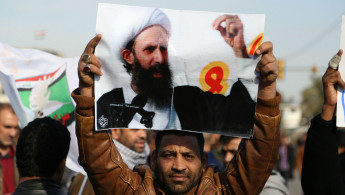Saudi Arabia defends death penalty verdict for Shia activists
Saudi Arabia's justice ministry has made a rare statement defending the death sentence passed on a group of Shia protesters.
2 min read
Saudi Arabia executed Shia cleric Nimr al-Nimr in 2016 [Anadolu]
Saudi Arabia has issued a rare statement defending its judicial system, amid intensified criticism over the kingdom's decision to execute 14 Shia activists.
Ministry of Justice Spokesman Mansour al-Qafari said all defendants facing trial in Saudi Arabia undergo due process, a statement read on Friday.
He added that terrorism-related cases and death penalty verdicts are reviewed by an appeals court and the supreme court, with 13 judges reviewing each case before an execution is carried out.
The 14 activists currently awaiting execution were arrested for protesting and alleged violence against security forces. According to rights group Reprieve, the group's initial verdict was delivered by a "secretive" counter-terrorism court.
"[It] used confessions extracted through torture as the basis of convictions," the human rights group claimed.
Among those convicred is Munir al-Adam, who was just 18 at the time of his arrest. In an interview with The Washington Post, his mother said that her son had been tortured by Saudi authorities.
Ministry of Justice Spokesman Mansour al-Qafari said all defendants facing trial in Saudi Arabia undergo due process, a statement read on Friday.
He added that terrorism-related cases and death penalty verdicts are reviewed by an appeals court and the supreme court, with 13 judges reviewing each case before an execution is carried out.
The 14 activists currently awaiting execution were arrested for protesting and alleged violence against security forces. According to rights group Reprieve, the group's initial verdict was delivered by a "secretive" counter-terrorism court.
"[It] used confessions extracted through torture as the basis of convictions," the human rights group claimed.
Among those convicred is Munir al-Adam, who was just 18 at the time of his arrest. In an interview with The Washington Post, his mother said that her son had been tortured by Saudi authorities.
"He has been ordered to stand for long intervals of time," the mother, Zahraa Abdullah, said. "He was beaten with sticks and cables. He was electrocuted and prevented from eating or going to the bathroom."
Sunni hardliners in the ultra-conservative kingdom have in the past declared Shias to be apostates. Authorities also accuse Shia activists in the country's restive east of working in the interests of regional rival Iran.
Last year, Saudi Arabia executed prominent Saudi Shia cleric Nimr al-Nimr, sparking a huge backlash from the country's Shia minority and from neighbouring countries.





 Follow the Middle East's top stories in English at The New Arab on Google News
Follow the Middle East's top stories in English at The New Arab on Google News
![Israeli forces ordered bombed Gaza's Jabalia, ordering residents to leave [Getty]](/sites/default/files/styles/image_330x185/public/2176418030.jpeg?h=a5f2f23a&itok=_YGZaP1z)

